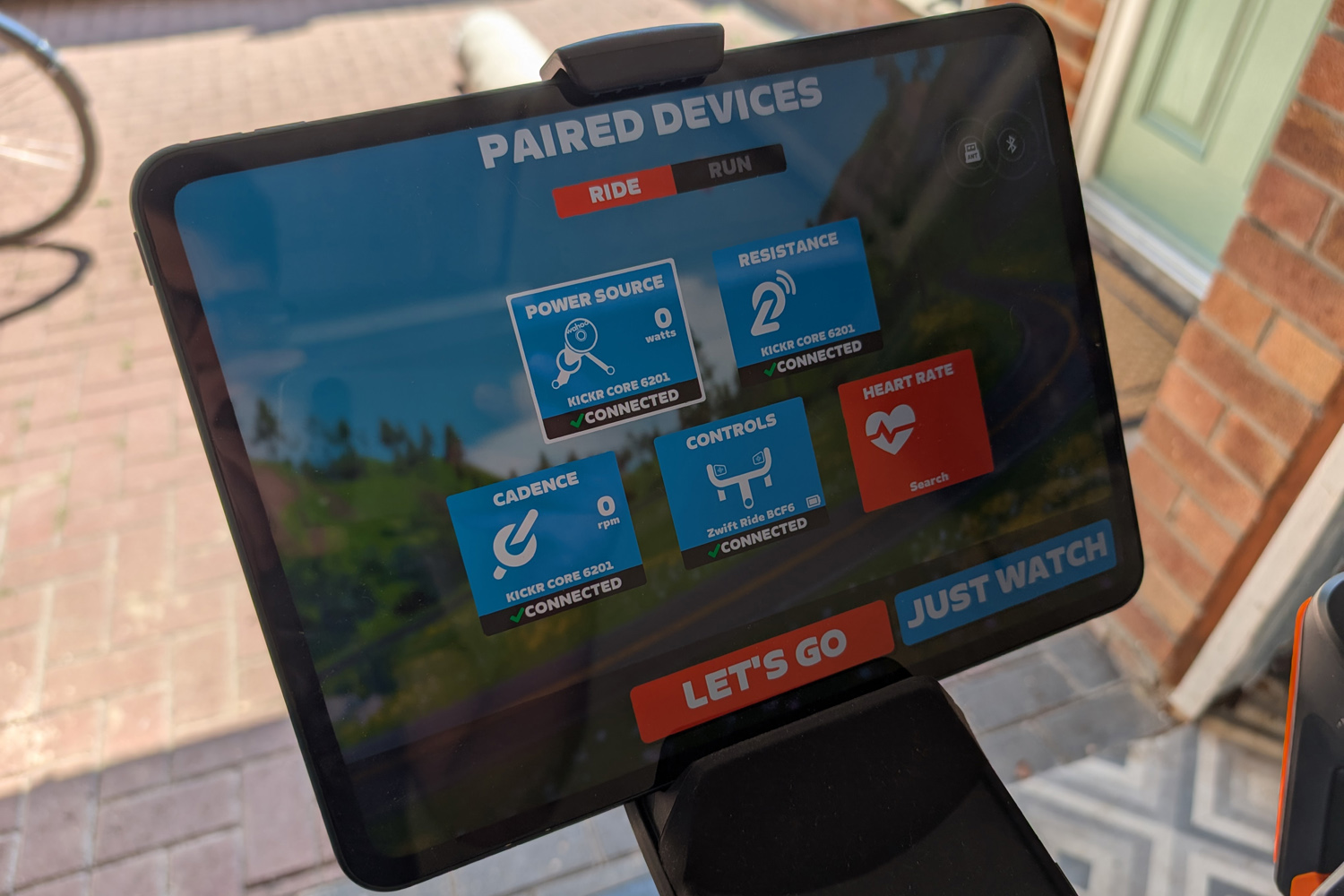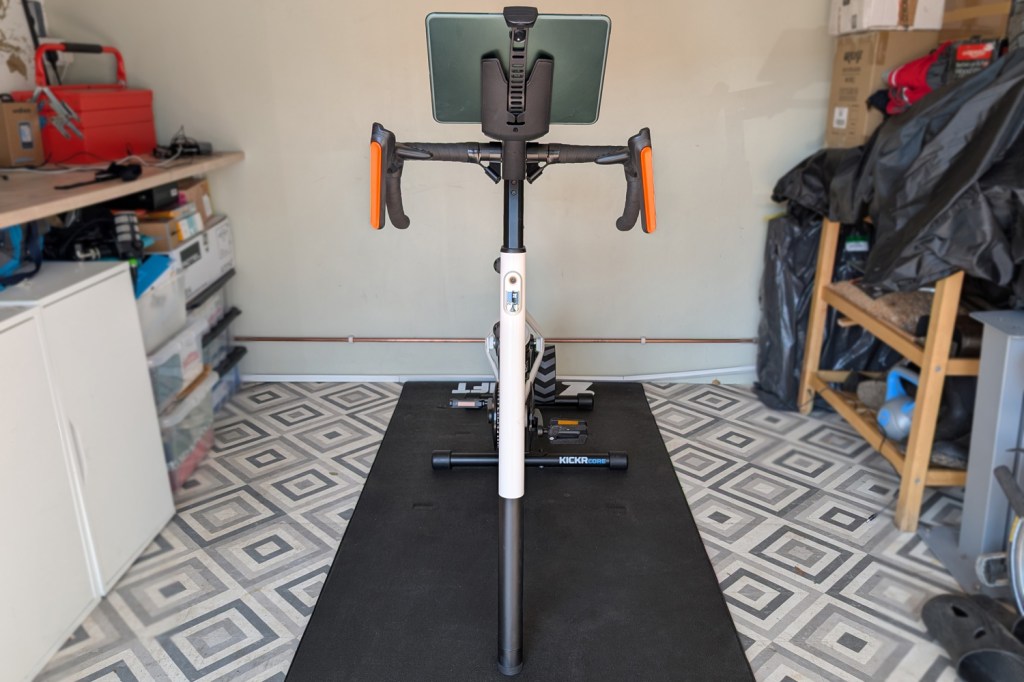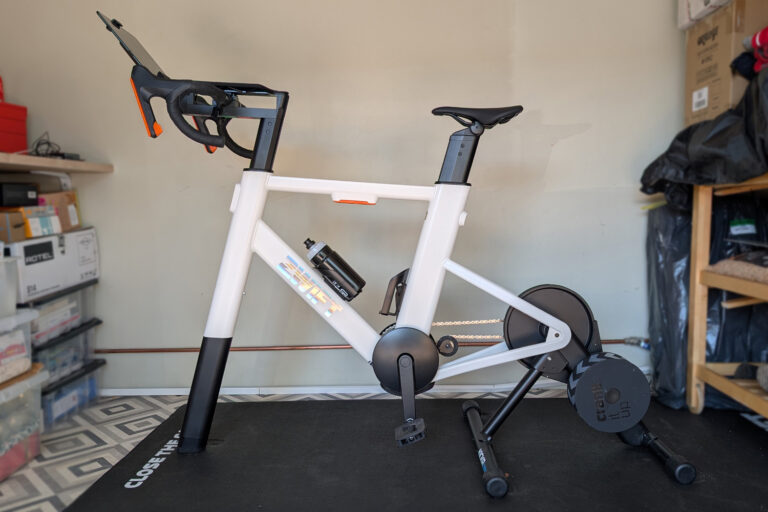Introduction
Zwift has long been a go-to for cyclists wanting to bring a bit of the outdoors to their indoor training sessions. The app’s virtual worlds and community of Lycra-clad avatars make long rides a lot more enjoyable than just staring at a power meter – but repurposing your road bike for each static session was a faff. The Zwift Ride smart bike is far simpler, and riding one gets impressively close to the real thing.
To call it ‘simply’ a steel stationary bike frame fitted with Zwift’s Play controllers and bolted to a Wahoo Kickr smart trainer would be doing the Ride a disservice – as would lumping it in with more generic exercise bikes. It was the closest I came to braving the elements during the winter months, and yet now the sun is shining, I’m still coming back ride after ride. The $1300/£1200 asking price is also pretty keen, versus buying a spare frame (and bars, and chainset) to pair with a different smart trainer.
Whether you’re already a Zwift subscriber or not, serious cyclists will find plenty to love here.
Design & build: in the frame
A lot of the Ride’s initial appeal is not having to accumulate a bunch of different kit yourself first. Order one and everything arrives in one big package (or rather, three) so you can be pedalling in under an hour – as long as you can follow an online instruction video, anyway. Keep in mind delivery will set you back $75/$50 – those boxes don’t contain feathers, you know.
The Kickr Core is Wahoo’s off-the-shelf smart trainer, just with a Zwift Cog hub in the box for virtual shifting. The Ride itself has a skinny white frame with an almost Apple-like minimalism. There’s nothing minimal about the 17kg weight, but construction is sturdy and the footprint refreshingly compact. Keep in mind the Kickr weighs 18kg, so you’re going to want to find a permanent place for it all. It’s easier on the eye than most fitness kit, so don’t feel it has to be relegated to a garage or outbuilding.
A single leg up front mimics a road bike’s fork and front wheel setup, while the cranks are a fixed 170mm. Serious cyclists wanting to mimic their road bike exactly might be miffed, but it’s not a problem for more casual riders. The two pre-fitted bottle cages are a sensible inclusion, too.
The 42cm-wide handlebars come pre-wrapped with bar tape and largely get the job done. If you’ve got specific size requirements you can swap it out for an alternative, though good luck integrating the Play controllers quite as neatly as they’ve done in the factory. The bar-mounted phone holder lets you get Zwifting right away – and the silicone mat is a handy space to store snacks or drinks – but the optional tablet holder is a must if you’ll be using a larger screen.
Features & setup: ready to ride

Setup is a breeze. You bolt the frame onto the included Wahoo Kickr Core trainer; fix the handlebars, saddle and stem using the simple A-Z sizing guide; and pair everything through the Zwift app via Bluetooth. Releasing and seating the chain – which is greased from the factory – is the only messy bit. Flat pedals are included in the box but can be swapped out if you’ve got a pair of clip-ins you’d rather use instead.
A handy hex key stashes neatly away underneath the top tube; it fits every one of the Ride’s bolts, which makes adjusting the pedals, handlebar and saddle for different riders a breeze. Zwift has added an A-Z scale, so you just need to remember a single letter after your initial measurement – much easier than reaching for a tape measure. It did indeed line up with my height, so I was immediately comfortably on the bike.
The Play controllers are where all the action is. Buttons for navigating Zwift’s menus are seamlessly integrated into the handlebars, with a D-pad on the left side and four face buttons on the right handle menu selections. They also activate Zwift PowerUps and give Ride Ons, which makes riding with others that bit more intuitive. Levers on either side handle braking, steering and virtual shifting, split across a large orange paddle and two buttons on each side.
Zwift includes a one-into-two USB-C charging cable to give the Play controllers juice (they last up to 20 hours each), while the Kickr Core comes with its own mains adapter. I used a multi-port power brick to keep both the controllers and my tablet powered up; just make sure you’ve got a socket or two spare during the initial setup.
Interface & performance: get your sweat on

You’ll need a Zwift subscription, as the Ride doesn’t even come with a free trial. After downloading the app to your phone or tablet, it’ll locate all your equipment. The only thing worth adding on top is a heart rate monitor. I tried using a WearOS app to pull info from my smartwatch, but it was a bit flakey; a chest strap is a safer bet. Once it’s all connected, you’re thrown into Zwift’s open world.
Newcomers might find the freeform approach to rides and workouts a little directionless at first, but converts will love the variety and the sheer number of friendly groups to join for a spot of peloton riding. There are literally hundreds of pre-set workouts to pick from, longer-term fitness plans to follow, and multiple virtual worlds to pedal around. I’m a big fan of New York’s Central Park and the Paris Champs Elysees loop, while Zwift’s own imaginary Wattopia has the widest variety.
The Ride does a convincing impression of a road bike, with just enough sway from the front leg without any chance of toppling – even when getting up out of the saddle for ascents. The virtual gearing is smooth and silent, with zero mechanical maintenance to worry about, and the Kickr Core is surprisingly quiet even when you’re at a full sprint.
Zwift Ride verdict

Road riding might have things like “fresh air” and “the beauty of nature” – but it also has rain, hand-numbing cold and angry drivers. The Zwift Ride avoids all that drama, and is the perfect entry-point for newcomers with no kit. Dedicated cyclists will also appreciate not having to constantly dismantle and mount their road bike just to rack up some indoor miles.
Those with a spare frame and smart trainer already aren’t really the Ride’s target market, and you’ve got to factor the ongoing cost of a Zwift membership into your purchase – but few off-the-shelf exercise bikes are as convincing as this.
Zwift Ride technical specifications
| Frame | Steel |
| Drivetrain | Zwift Cog (9-spd) |
| Maximum power output | 1800 watts |
| Crank length | 170mm |
| Handlebar width | 420mm |
| Connectivity | ANT+, Bluetooth |
| Battery life | 20 hours (controllers) |
| Weight | 17kg (frame), 18kg (Wahoo Kickr Core) |
Read the full article here
